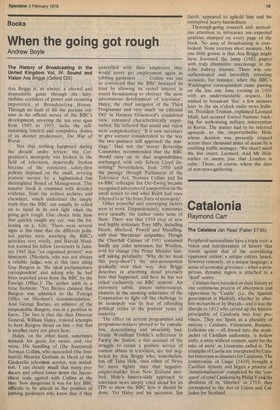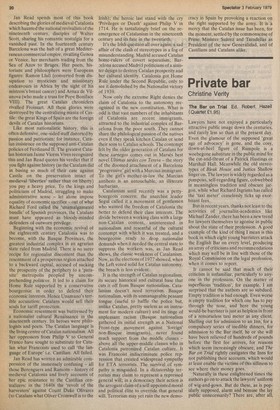Catalonia
Raymond Carr
The Catalans Jan Read (Faber £7.95) Peripheral nationalisms have a triple root: a vision and interpretation of history that stands against that of the centralizing oppressor nation; a unique culture based, however remotely, on a unique language; a sense of economic grievance — when a prosperous, dynamic region is attached to a `dead' centre.
Catalans have brooded on their history as one continuous process of absorption and oppression by `Castile' (i.e. the Spanish government in Madrid), whether by absolute monarchs or by liberals — and it was the liberals in 1812 who carved up the historic principality of Catalonia into four provinces. They see Spain as a plurality of nations — Catalans, Valencians, Basques, Galicians etc — all forced into the straitjacket of Castilian uniformity, 'a hollow unity, a unity without content, unity for the sake of unity' as Unamuno called it. The triumphs of Castile are interpreted by Catalan historians as disasters for Catalonia. The compromise of Caspe (1410) brought a Castilian dynasty and began a process of `denationalization' completed by the 'conquest' of rebel Catalonia by Philip Van the abolition of its 'liberties' in 1715: they correspond to the Act of Union and Culloden for Scotland. Jan Read spends most of this book describing the glories of medieval Catalonia which haunted the national revivalists of the nineteenth century, disciples of Walter Scott, sharing his romantic nostalgia for a vanished past. In the fourteenth century Barcelona was the hub of a great Mediterranean commercial empire, rivalling Genoa or Venice, her merchants trading from the Sea of Azov to Bruges. Her poets, historians and philosophers were European figures: Ramon Llull (converted from dissipation to mysticism and missionary endeavours in Africa by the sight of his mistress's breast cancer) and Arnau de Vilanova (who made a truss for Pope Boniface VIII). The great Catalan chroniclers rivalled Froissart. All these glories were destroyed by the centralizing mania of Castile: the great Kings of Spain are the foreign devils of Catalan historians.
Like most nationalistic history, this is often defensive, one-sided stuff distorted by passion and patriotism: for instance, Catalan insistence on the supposed anti-Catalan policies of Ferdinand II. The greatest Catalan historian Jaime Vicens Vives recognized this and Jan Read quotes his verdict that if you fight against history (as the Catalans did in basing so much of their case against Castile on the preservation intact of medieval `liberties' rather than on liberty) you pay a heavy price. To the kings and politicians of Madrid, struggling to make administrative sense — let alone impose equality of economic sacrifice — out of what Richard Ford called the `unamalgamated bundle' of Spanish provinces, the Catalans must have appeared as bloody-minded defenders of outworn privilege.
Beginning with the economic revival of the eighteenth century Catalonia was to become, with the Basque Provinces, the greatest industrial complex in an agrarian state ruled from Madrid. There is no surer recipe for regionalist discontent than the resentment of a prosperous region attached to a backward capital, accused of sucking the prosperity of the periphery to a `parasite' metropolis peopled by uncomprehending politicos. It led to a claim for Home Rule supported by a conservative bourgeoisie in order to defend their economic interests. Hence Unamuno's terrible accusation: Catalans would sell their souls for tariff protection.
Economic resentment was buttressed by a nationalist cultural Renaissance in the nineteenth century. Its heroes were philologists and poets. The Catalan language is the living centre of Catalan nationalism. All her oppressors from Philip V to General Franco have sought to substitute for Catalan what Francoists used to call `the language of Europe' i.e. Castilian. All failed.
Jan Read has written an admirable compression of the immensely confusing — all those Berenguers and Ramons — history of medieval Catalonia and lively accounts of her epic resistance to the Castilian centralizers: in the 1640s the 'revolt of the harvesters' against Count Duke Olivares (to Catalans what Oliver Cromwell is to the Irish); the heroic last stand with the cry `Privileges or Death' against Philip V in 1714. He is tantalizingly brief on the reemergence of Catalanism in the nineteenth century and its fate in the twentieth.
It's the Irish question all over again: a sad affair of the clash of stereotypes in a fog of misunderstanding. Madrid accused Catalan home-rulers of covert separatism; Barelona accused Madrii politicians of a sinister design to destroy Catalan prosperity and her cultural identity. Catalonia got Home Rule under the Second Republic, only to see it demolished by the Nationalist victory of 1939.
Now only the extreme Right denies the claim of Catalonia to the autonomy recognized in the new constitution. What is odd is that vast numbers of the inhabitants of Catalonia are recent immigrants, attracted to the industrial complex of Barcelona from the poor south. They cannot share the philological passion of the natives even if they speak kitchen Catalan or send their sons to Catalan schools. The contempt felt by the older generation of Catalans for these xarnegos comes out in Marses best novel Ultimas tardes con Teresa — the story of the doomed attachment of a Barcelona 'progressive' girl with a Murcian immigrant. To the girl's mother-in-law the Murcian antihero is an untouchable, an illiterate barbarian.
Catalanism until recently was a pettybourgeois concern: the anarchist leader Segui called it a movement of gentlemen who wanted the freedom of Catalonia the better to defend their class interests. The divide between a working class with a large non-Catalan content, uninterested in nationalism and resentful of the cultural contempt with which it was treated, and a bourgeoisie ready to drop nationalist demands when it needed the central state to suppress the workers was, as Jan Read shows, the classic weakness of Catalanism. Now, as the elections of 1977 showed, when the Left voted solid for Catalan autonomy, the breach is less evident.
It is the strength of Catalan regionalism, its secure historical and cultural base that cuts it off from Basque nationalism. Catalanism doesn't need terrorism. Basque nationalism, with its unmanageable peasant tongue (useful to baffle the police but, unlike Catalan, pretty useless as an instrument for modern culture) and its tinge of unpleasant racism (Basque nationalism gathered its initial strength as a National Front-type movement against 'foreign' non-Basque immigrants), never found much support from the middle classes — above all the upper-middle classes who in Catalonia patronized Catalan culture. It was Francoist indiscriminate police repression that created widespread sympathy for ETA terrorists. The survival of sympathy is misguided. In a dictatorship terrorists may claim to represent a repressed general will; in a democracy their action is the arrogant claim of a self-appointed moral and political elite to override that general will. Terrorism may yet ruin the new demo cracy in Spain by provoking a reaction on the right supported by the army. It is a mercy that the Catalan issue has been, for the moment, settled by the commonsense of Prime Minister Suarez and Taradellas as President of the new Generalidad, and of Castilians and Catalans alike.



































 Previous page
Previous page